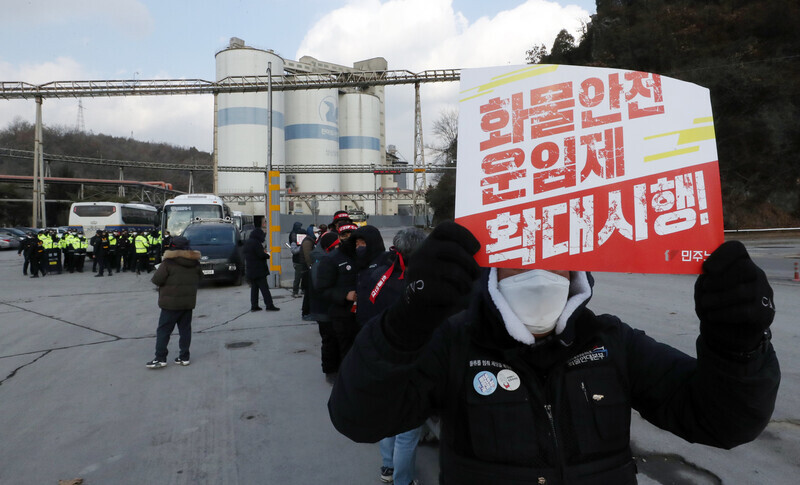hankyoreh
Links to other country sites 다른 나라 사이트 링크
Korea issues another round of back-to-work orders for striking truckers

The South Korean government issued a back-to-work order on Thursday for the steel and petrochemical transportation sectors, which are on strike. This is the second issuance of such an order following Nov. 29, when the government issued a back-to-work order for the cement sector.
At a Cabinet meeting held at the government complex in Seoul on Thursday morning, Prime Minister Han Duck-soo said that the government “hereby issues a second round of back-to-work orders for the steel and petrochemical fields following that for the cement sector issued on Nov. 29.”
These orders come amidst a strike by members of the Cargo Truckers Solidarity Division (TruckSol) demanding the abolition of the sunset provision of the safe freight rates system and the expansion of the system to include other types of cargo.
The strike — a “dry out” strategy relying on hardline measures instead of talks — seems to have stemmed from the judgment that the situation will turn advantageous to the government as more time goes by.
The government held a meeting of related ministries on Wednesday presided over by the Deputy Prime Minister and Minister of Economy and Finance Choo Kyung-ho to examine the damage caused by the TruckSol strike.
After the meeting, the Ministry of Economy and Finance said, “Related ministries inspected the situation in the steel and fuel sectors and agreed that a back-to-work order was necessary.”
“We decided to submit the issue to an extraordinary Cabinet meeting on Dec. 8 for discussion.”
The government has also commenced full-scale efforts to punish strikers refusing the back-to-work orders.
The Ministry of Land, Infrastructure and Transport (MOLIT) said Wednesday that it had filed a complaint against a transport vehicle owner who is “refusing the back-to-work order without a justified reason,” and asked the relevant local government to take administrative measures against him, namely, a 30-day suspension of his license.
The government has been using other ways to pressure the TruckSol workers, repeatedly hinting at possibly suing strike participants for damages or restricting the fuel subsidies to which they are legally entitled.
Since the start of the strike on Nov. 24, the government and TruckSol have had only two official meetings: on Nov. 28 and Nov. 30.
In administration circles, there is frequent talk that time is on the government’s side, with TruckSol getting driven into a corner as the end of the year approaches and the sunset clause of the safe trucking freight rates system kicks in.
“The strike has really lost steam,” said one government official. “It seems [TruckSol] can’t hold out for much longer. I think the strike won’t last that long.”
MOLIT on Tuesday checked on 11 of the 33 cement transportation companies and 516 of the 778 truck drivers who took part in last week’s strike.
Except for the one truck owner against whom the government had filed a complaint, all had either returned to work or expressed their intention to return.
TruckSol says it wants to continue the strike.
“We cannot follow the laws and principles of just the Yoon administration, which forces concessions from only powerless workers for the profit of big corporate capital,” said the union.
“The attitude of the Yoon administration, which defines a workers’ strike as a social evil, is really dangerous.”
Jung Heung-jun, a professor of management at Seoul National University of Science and Technology, said that by maintaining its hardline attitude against TruckSol, the government is trying to appear as if it is reforming labor by standing against the Korean Confederation of Trade Unions as a matter of principle.
He said, “TruckSol is becoming a sacrificial lamb as the government uses this politically.”
By Choi Ha-yan, staff reporter; Jeon Jong-hwi, staff reporter
Please direct questions or comments to [english@hani.co.kr]

Editorial・opinion
![[Column] Has Korea, too, crossed the Rubicon on China? [Column] Has Korea, too, crossed the Rubicon on China?](https://flexible.img.hani.co.kr/flexible/normal/500/300/imgdb/original/2024/0419/9317135153409185.jpg) [Column] Has Korea, too, crossed the Rubicon on China?
[Column] Has Korea, too, crossed the Rubicon on China?![[Correspondent’s column] In Japan’s alliance with US, echoes of its past alliances with UK [Correspondent’s column] In Japan’s alliance with US, echoes of its past alliances with UK](https://flexible.img.hani.co.kr/flexible/normal/500/300/imgdb/original/2024/0419/2317135166563519.jpg) [Correspondent’s column] In Japan’s alliance with US, echoes of its past alliances with UK
[Correspondent’s column] In Japan’s alliance with US, echoes of its past alliances with UK- [Editorial] Does Yoon think the Korean public is wrong?
- [Editorial] As it bolsters its alliance with US, Japan must be accountable for past
- [Guest essay] Amending the Constitution is Yoon’s key to leaving office in public’s good graces
- [Editorial] 10 years on, lessons of Sewol tragedy must never be forgotten
- [Column] A death blow to Korea’s prosecutor politics
- [Correspondent’s column] The US and the end of Japanese pacifism
- [Guest essay] How Korea turned its trainee doctors into monsters
- [Guest essay] As someone who helped forge Seoul-Moscow ties, their status today troubles me
Most viewed articles
- 1[Column] The clock is ticking for Korea’s first lady
- 2After 2 months of delayed, denied medical care, Koreans worry worst may be yet to come
- 3Samsung barricades office as unionized workers strike for better conditions
- 4[Column] Has Korea, too, crossed the Rubicon on China?
- 5All eyes on Xiaomi after it pulls off EV that Apple couldn’t
- 6[Correspondent’s column] In Japan’s alliance with US, echoes of its past alliances with UK
- 7US overtakes China as Korea’s top export market, prompting trade sanction jitters
- 8Hong Se-hwa, voice for tolerance whose memoir of exile touched a chord, dies at 76
- 9[Photo] Smile ambassador, you’re on camera
- 10[Editorial] When the choice is kids or career, Korea will never overcome birth rate woes